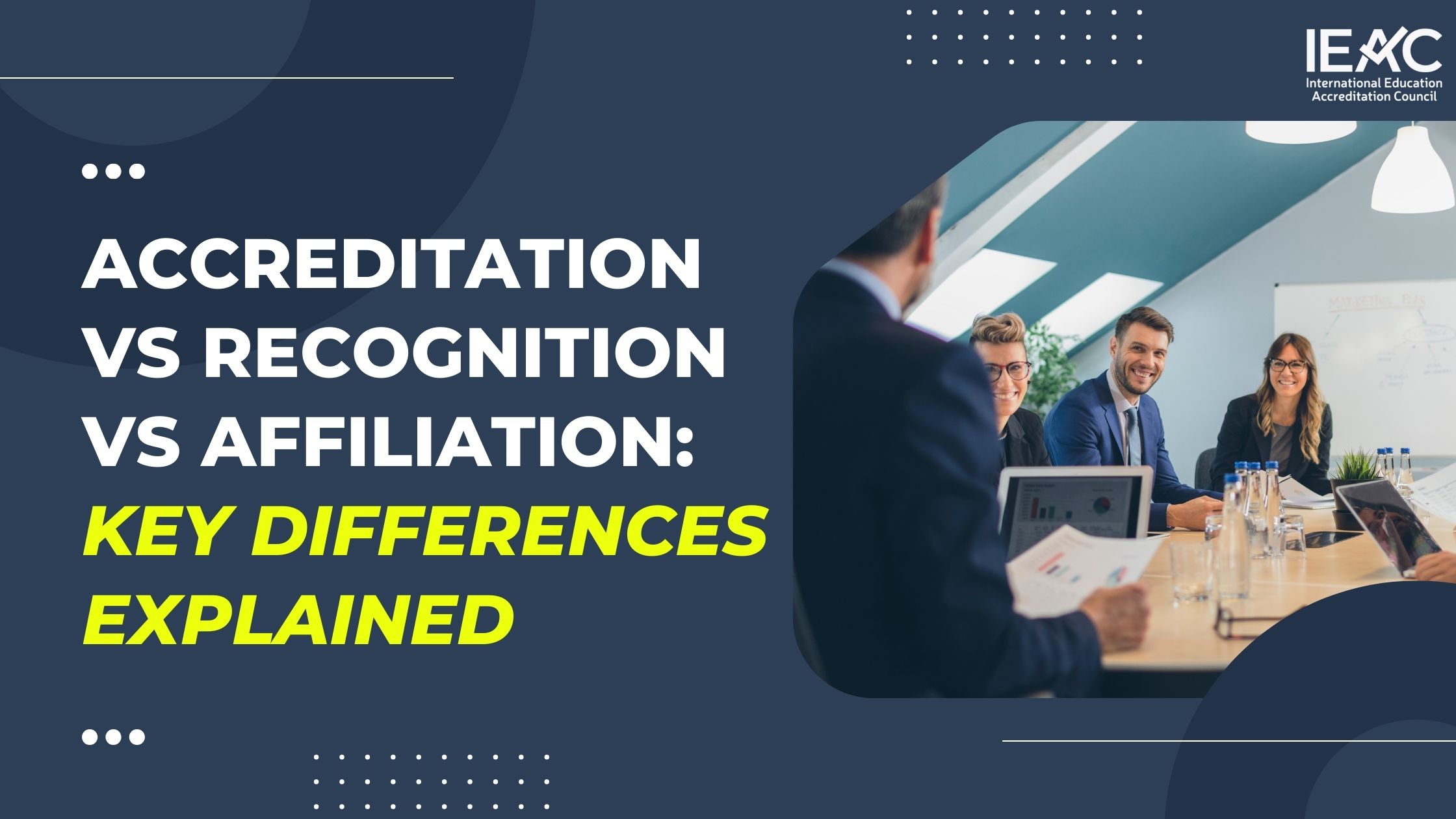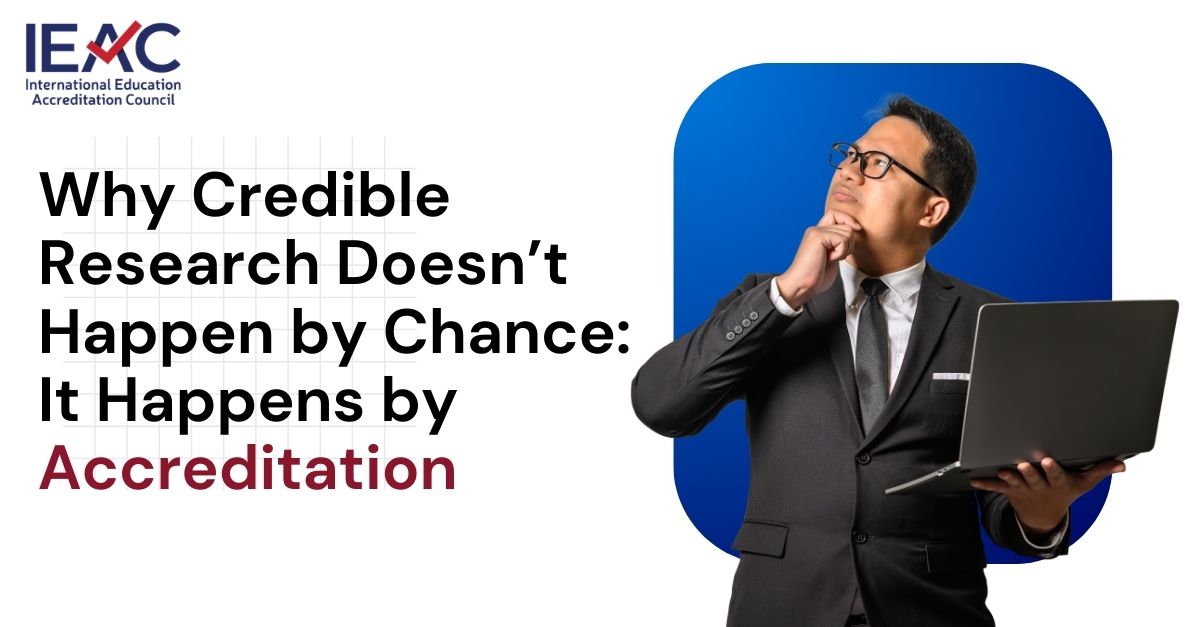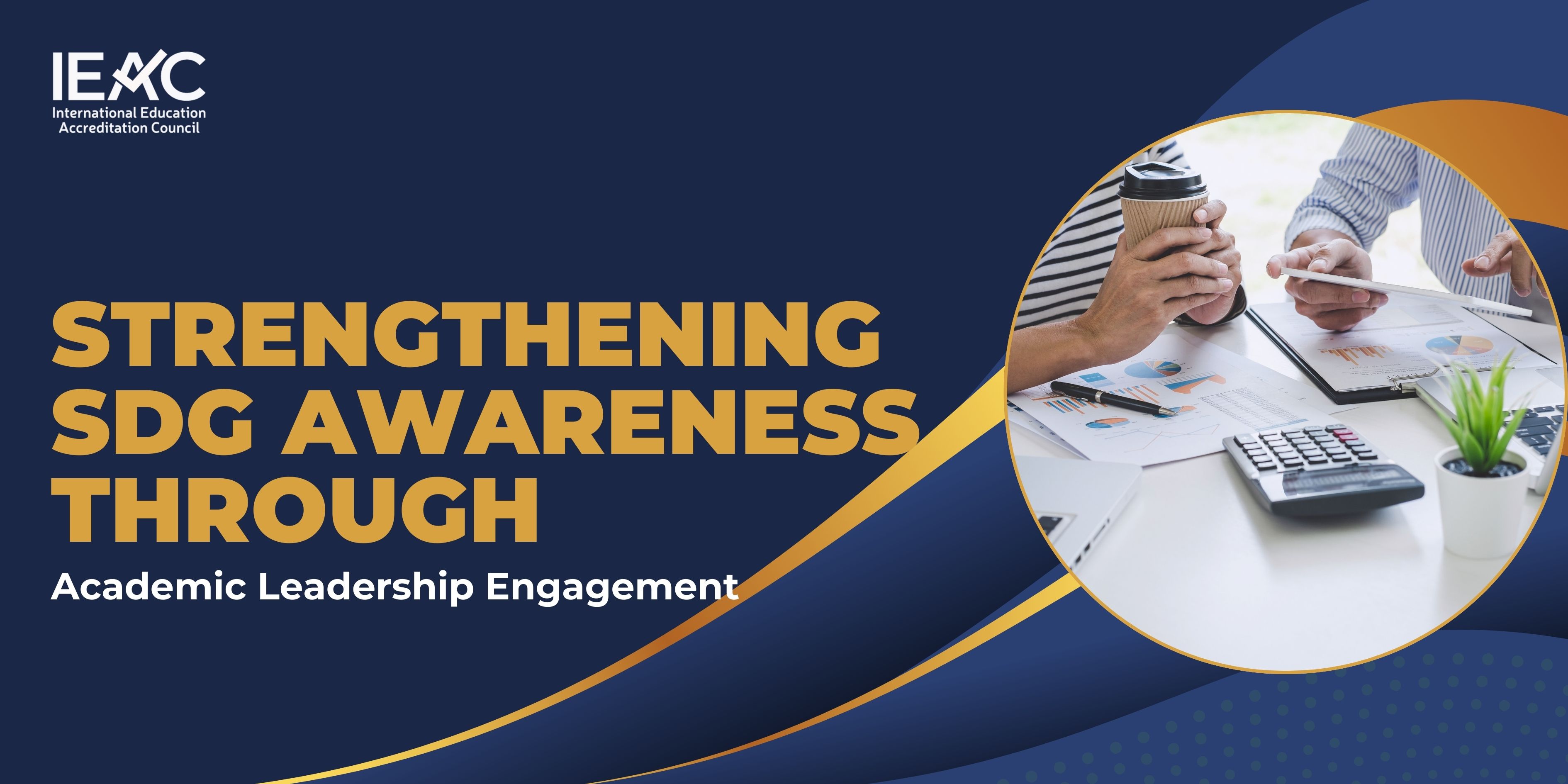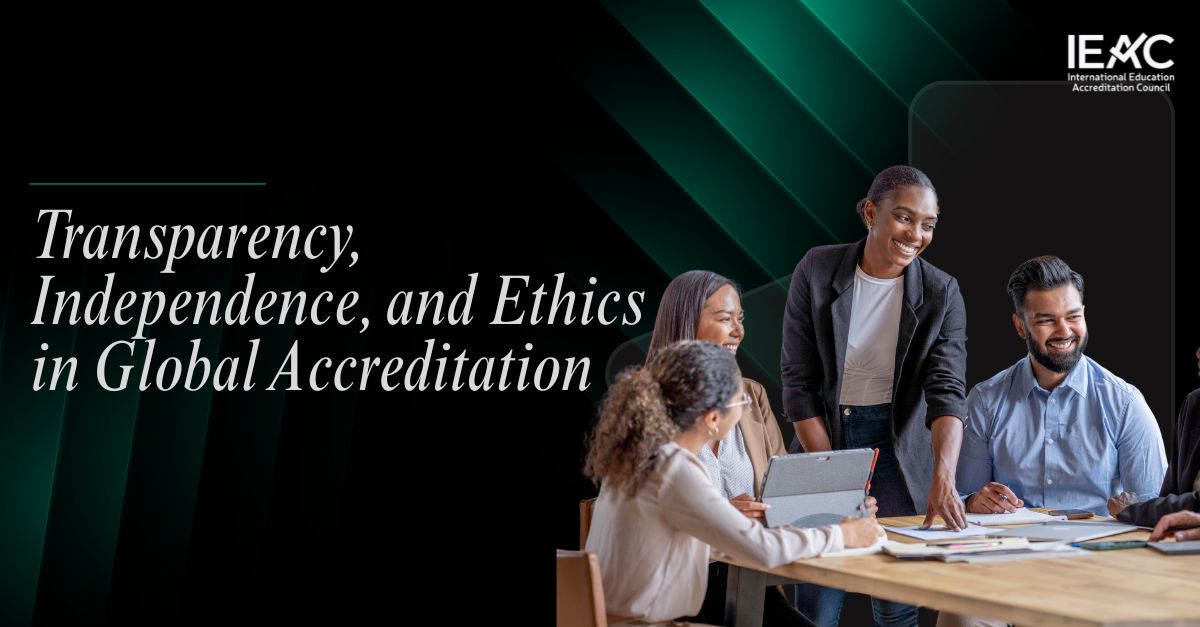- Home
- About IEAC
- Accreditation
- University Accreditation
- College Accreditation
- Online Institution Accreditation
- School Accreditation
- University Recruitment Agency Accreditation
- Programmatic Accreditation
- Teacher/ Lecturer Accreditation
- Religious Institutes Accreditation
- Affiliate Accreditation
- Research Accreditation Candidacy Accreditation
- IEAC Membership
- Institutions Accredited
- Accreditation Process
- Contact Us Webinar Apply Now
Blog
Capacity Building Beyond Training: Institutional Learning Ecosystems in Higher Education
Lorem ipsum dolor sit amet, consectetur adipiscing elit, sed do eiusmod tempor incididunt ut labore et dolore magna aliqua. Quis ipsum suspendisse ultrices gravida. Risus commodo viverra maecenas accumsan lacus vel facilisis.
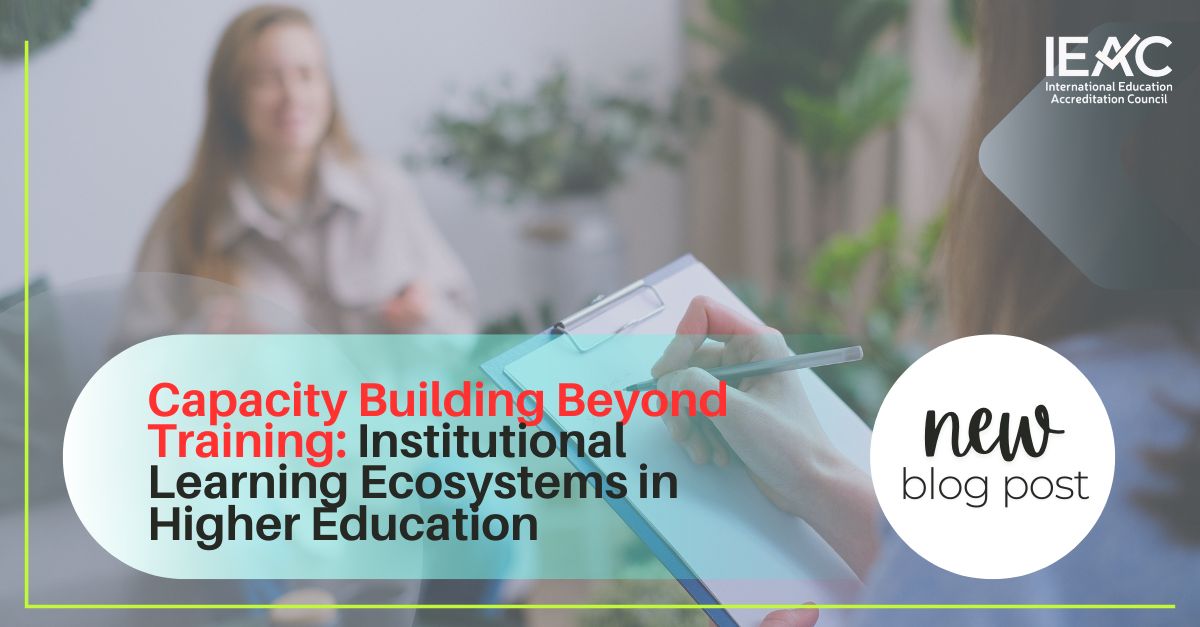
Capacity Building Beyond Training: Institutional Learning Ecosystems in Higher Education
Training is No Longer Enough
Workshops, seasonal trainings, and isolated development sessions—these have long defined what universities consider “capacity building.” But in the face of rapid digital transformation and shifting learner needs, such approaches are no longer sufficient. The real work of capacity building begins when institutions move beyond events and start thinking in ecosystems.
Building sustainable capacity means embedding learning into the institution itself—across roles, hierarchies, and functions. It’s about aligning professional development with institutional values, leadership goals, and quality frameworks. This reframing is not optional. It has become a foundational pillar for evaluating quality and institutional readiness in the digital age.
Capacity Building as an Ecosystem, Not an Event
The contrast between “training” and “institutional learning ecosystems” is more than semantic. It’s a shift in how universities understand growth, innovation, and resilience.
In traditional models:
- Knowledge flows one way—from expert to learner.
- Trainings are reactive and one-size-fits-all.
- There is little institutional memory or knowledge transfer.
In learning ecosystems:
- Knowledge circulates through peer-learning, mentoring, and knowledge-sharing systems.
- Development is continuous, responsive, and often self-directed.
- Organizations learn as much as individuals do.
Examples of ecosystem-based approaches include:
- Internal knowledge hubs or communities of practice.
- Systems for peer observation and feedback.
- Data-driven development plans tied to real performance.
- Regular self-assessment and organizational reflection.
These mechanisms reflect the vision outlined by the OECD Education 2030 Project, which emphasizes continuous institutional learning—not compliance for its own sake, but learning as the engine of institutional quality.
Continuous Professional Development in Digital Universities
In the context of online and digital universities, professional development takes on added complexity—and urgency. The digital transformation of higher education requires staff to master not only technical tools but pedagogical and organizational shifts.
Effective capacity building in this space must include all university roles:
- Academic staff need support in hybrid pedagogy, learning analytics, and student engagement.
- Administrators require skills in data systems, change management, and digital services.
- Leaders must be fluent in digital strategy, quality assurance, and institutional transformation.
The Jisc Building Digital Capability framework recommends personalized pathways for digital growth across all professional categories. It emphasizes digital teaching, creation, collaboration, and leadership as distinct but interconnected dimensions.
This thinking is echoed in UNESCO’s report on Education in a post-COVID world, which highlights the need for institutions to evolve into adaptive, learning-focused environments that support all personnel—not just learners, but educators and administrators alike.
Faculty and Staff: Real-World Applications of Institutional Learning
Digital universities around the world are already experimenting with ecosystem-based models of capacity building. Their efforts provide practical examples of how institutional learning can operate in daily practice.
These models often include:
- Ongoing internal workshops shaped by emerging needs.
- LMS-based micro-learning modules for on-demand skill building.
- Data dashboards that faculty use to reflect on teaching and improve outcomes.
- Peer observation programs that normalize feedback and continuous improvement.
At Vertex, for instance, digital capability is not viewed as a separate initiative. It is woven into team planning, academic onboarding, and leadership development. Faculty collaborate across departments using shared data and tools, reinforcing a culture of co-learning and co-creation. These efforts are not driven by external mandates—they arise from a shared institutional commitment to meaningful, sustainable development.
Accreditation and Capacity Building: Two Sides of the Same Coin
Accreditation systems, such as those shaped by IEAC’s evolving quality frameworks, are increasingly focused on how institutions learn. Key questions include:
- Is professional development aligned with governance and strategic direction?
- Are development outcomes reviewed and integrated into institutional planning?
- Do the same skill gaps persist year after year, or is there evidence of institutional learning?
True quality assurance goes beyond documenting activities. It evaluates whether those activities lead to growth, innovation, and adaptive capacity. Institutions should be able to demonstrate:
- That development is systemic, not episodic.
- That learning happens across functions and levels.
- That capacity building contributes directly to institutional resilience.
Vertex’s case illustrates how this alignment can work. By integrating professional growth into its performance systems and accreditation readiness, the university strengthens not only compliance but strategic agility.
Institutions That Learn, Earn Trust
The institutions that will lead higher education into the future are those that continuously learn, adapt, and grow. Capacity building is no longer a supplementary activity—it is a core strategy for institutional quality, credibility, and impact.
As accreditation systems like IEAC’s evolve, institutions must rise to meet a new standard: not just what they teach, but how they themselves learn.
For digital universities especially, building institutional learning ecosystems offers a path toward sustainable development and sector-wide leadership. It is an investment in people, in systems, and ultimately, in trust.
To support this transformation, the European Commission’s Digital Education Action Plan calls for long-term institutional strategies—not quick fixes. It frames staff development as a strategic investment in institutional evolution.
References
· OECD – Education 2030 Project
· Jisc – Building Digital Capability
